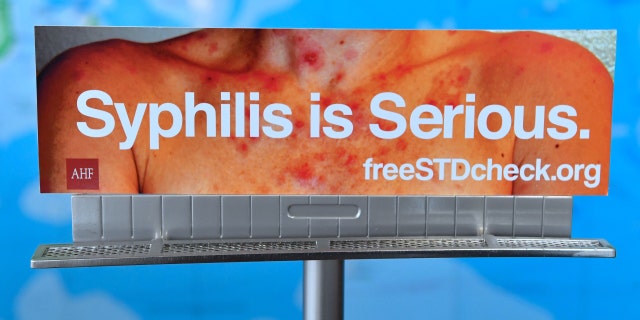Health
Houston health officials report syphilis outbreak, 128% spike in cases among women

What are the most common STDs?
Amid public health funding cuts and clinic closures, the three most common sexually transmitted diseases are on the rise as U.S. infections increase.
Houston health officials are warning residents of a syphilis outbreak that is responsible for a 128% increase in cases among women.
The Houston Health Department said it has also led to a nine-fold rise in congenital syphilis in Houston and Harris County.
Statistics indicated that new infections rose by 57%, from 1,845 in 2019 to 2,905 in 2022.
The number of cases among women totaled 674 last year, which is up from 295 in 2019.
FOUNDER OF SEX-CENTRIC WELLNESS COMPANY PLEADS NOT GUILTY TO MANIPULATING TRAUMATIZE PEOPLE INTO DEBT
The I-45 running past downtown is shown from the Chase Tower observation floor in Houston on Sept. 7, 2021. (Brett Coomer/Houston Chronicle via Getty Images)
Congenital syphilis rose from 16 cases in 2016 to 151 cases in 2021, the latest year for which statistics are available.
The department said Thursday that it would launch a rapid outreach response to address the issue, including increasing screening opportunities, targeting hotspots and mobilizing community partners to curb new infections.
“It is crucial for pregnant women to seek prenatal care and syphilis testing to protect themselves from an infection that could result in the deaths of their babies,” Marlene McNeese Ward, deputy assistant director in the department’s Bureau of HIV/STI and Viral Hepatitis Prevention, said in a statement. “A pregnant woman needs to get tested for syphilis three times during her pregnancy.”
The department is waiving all clinical fees for sexually transmitted infections at its health centers and expanding the use of its HIV/STD mobile clinic
It is also working with medical providers and collaborating with community-based partners to increase awareness of the outbreak and enhance testing and treatment.

A model of a billboard from the AIDS Healthcare Foundation, which ran in Los Angeles earlier this year but has been rejected to be displayed in many other cities, is seen at the AHF office in Hollywood, California, on May 18, 2018. (FREDERIC J. BROWN/AFP via Getty Images)
NEW MEXICO LEADS US WITH HIGHEST RATE OF CONGENITAL SYPHILIS
Testing is recommended three times: at a woman’s first prenatal visit, during the third trimester and at delivery.
Untreated syphilis during pregnancy can result in a stillbirth or a baby’s death soon after birth.
Notably, those with syphilis are at increased risk of HIV infection due to the painless sore that develops at the site of sexual contact during the disease’s first stage.

Downtown Houston is seen behind railroad tracks on Sept. 14, 2022. (Brandon Bell/Getty Images)
While syphilis is easily treatable with antibiotics, without treatment, the infection progresses to the secondary stage when one or more areas of the skin break into a rash.
Nevertheless, in most cases, syphilis goes undetected because the signs and symptoms are misinterpreted or unnoticed.
If untreated, the bacterium that causes syphilis remains in the body and begins to damage the internal organs.
The department recommends syphilis testing for pregnant women at their initial prenatal visit, third trimester and delivery; those who have had unprotected sex, people with multiple sex partners; men with anonymous sex partners; and people recently diagnosed with any other sexually transmitted disease.

Health
Semaglutide Pills and Injections Vs. Drops: Experts Weigh In | Woman's World

Sign Up
Create a free account to access exclusive content, play games, solve puzzles, test your pop-culture knowledge and receive special offers.
Already have an account? Login
Use left and right arrow keys to navigate between menu items.
Use escape to exit the menu.
Health
Jennifer Hudson Lost 80-Lbs Without Depriving Herself—Learn Her Secrets

Sign Up
Create a free account to access exclusive content, play games, solve puzzles, test your pop-culture knowledge and receive special offers.
Already have an account? Login
Use left and right arrow keys to navigate between menu items.
Use escape to exit the menu.
Health
Kennedy’s Plan for the Drug Crisis: A Network of ‘Healing Farms’

Though Mr. Kennedy’s embrace of recovery farms may be novel, the concept stretches back almost a century. In 1935, the government opened the United States Narcotic Farm in Lexington, Ky., to research and treat addiction. Over the years, residents included Chet Baker and William S. Burroughs (who portrayed the institution in his novel, “Junkie: Confessions of an Unredeemed Drug Addict”). The program had high relapse rates and was tainted by drug experiments on human subjects. By 1975, as local treatment centers began to proliferate around the country, the program closed.
In America, therapeutic communities for addiction treatment became popular in the 1960s and ’70s. Some, like Synanon, became notorious for cultlike, abusive environments. There are now perhaps 3,000 worldwide, researchers estimate, including one that Mr. Kennedy has also praised — San Patrignano, an Italian program whose centerpiece is a highly regarded bakery, staffed by residents.
“If we do go down the road of large government-funded therapeutic communities, I’d want to see some oversight to ensure they live up to modern standards,” said Dr. Sabet, who is now president of the Foundation for Drug Policy Solutions. “We should get rid of the false dichotomy, too, between these approaches and medications, since we know they can work together for some people.”
Should Mr. Kennedy be confirmed, his authority to establish healing farms would be uncertain. Building federal treatment farms in “depressed rural areas,” as he said in his documentary, presumably on public land, would hit political and legal roadblocks. Fully legalizing and taxing cannabis to pay for the farms would require congressional action.
In the concluding moments of the documentary, Mr. Kennedy invoked Carl Jung, the Swiss psychiatrist whose views on spirituality influenced Alcoholics Anonymous. Dr. Jung, he said, felt that “people who believed in God got better faster and that their recovery was more durable and enduring than people who didn’t.”
-
/cdn.vox-cdn.com/uploads/chorus_asset/file/25822586/STK169_ZUCKERBERG_MAGA_STKS491_CVIRGINIA_A.jpg)
/cdn.vox-cdn.com/uploads/chorus_asset/file/25822586/STK169_ZUCKERBERG_MAGA_STKS491_CVIRGINIA_A.jpg) Technology1 week ago
Technology1 week agoMeta is highlighting a splintering global approach to online speech
-

 Science1 week ago
Science1 week agoMetro will offer free rides in L.A. through Sunday due to fires
-
/cdn.vox-cdn.com/uploads/chorus_asset/file/23935558/acastro_STK103__01.jpg)
/cdn.vox-cdn.com/uploads/chorus_asset/file/23935558/acastro_STK103__01.jpg) Technology1 week ago
Technology1 week agoAmazon Prime will shut down its clothing try-on program
-

 News1 week ago
News1 week agoMapping the Damage From the Palisades Fire
-
/cdn.vox-cdn.com/uploads/chorus_asset/file/25826211/lorealcellbioprint.jpg)
/cdn.vox-cdn.com/uploads/chorus_asset/file/25826211/lorealcellbioprint.jpg) Technology7 days ago
Technology7 days agoL’Oréal’s new skincare gadget told me I should try retinol
-
/cdn.vox-cdn.com/uploads/chorus_asset/file/25832751/2192581677.jpg)
/cdn.vox-cdn.com/uploads/chorus_asset/file/25832751/2192581677.jpg) Technology3 days ago
Technology3 days agoSuper Bowl LIX will stream for free on Tubi
-

 Business5 days ago
Business5 days agoWhy TikTok Users Are Downloading ‘Red Note,’ the Chinese App
-
/cdn.vox-cdn.com/uploads/chorus_asset/file/25835602/Switch_DonkeyKongCountryReturnsHD_scrn_19.png)
/cdn.vox-cdn.com/uploads/chorus_asset/file/25835602/Switch_DonkeyKongCountryReturnsHD_scrn_19.png) Technology1 day ago
Technology1 day agoNintendo omits original Donkey Kong Country Returns team from the remaster’s credits















